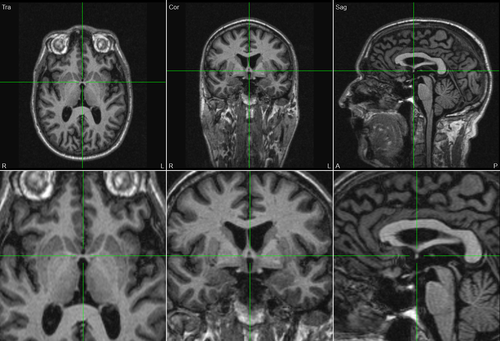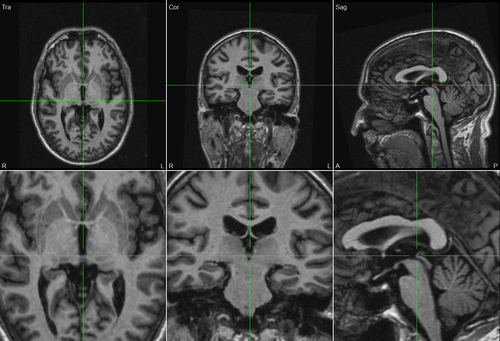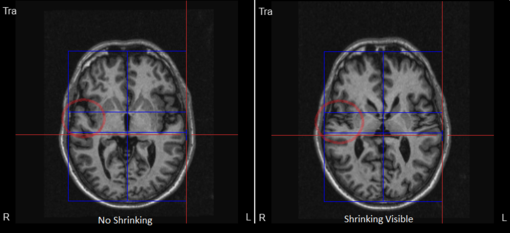Difference between revisions of "Marking AC-PC Points in BESA MRI"
m |
|||
| (9 intermediate revisions by 2 users not shown) | |||
| Line 2: | Line 2: | ||
|title = Module information | |title = Module information | ||
|module = BESA MRI | |module = BESA MRI | ||
| − | |version = 2.0 or higher | + | |version = BESA MRI 2.0 or higher |
}} | }} | ||
| − | In BESA MRI, the transformation of the original data into the ACPC coordinate system is defined by first marking the middle of the anterior commissure (AC). Then we rotate the MR image to obtain an optimal view of the ACPC plane (PC=posterior commissure) and the best separation of both hemispheres by the sagittal plane. The marking of the PC completes the | + | In BESA MRI, the transformation of the original data into the ACPC coordinate system is defined by first marking the middle of the anterior commissure (AC). Then we rotate the MR image to obtain an optimal view of the ACPC plane (PC = posterior commissure) and the best separation of both hemispheres by the sagittal plane. The marking of the PC completes the transformation step. |
| − | + | ||
== Marking the AC and PC points in BESA MRI == | == Marking the AC and PC points in BESA MRI == | ||
| − | [[File:AC.png|200px|thumb|right|Marking the AC in BESA MRI]] [[File:PC.png|200px|thumb|right|Marking the PC in BESA MRI]] | + | |
| + | <!-- [[File:AC.png|200px|thumb|right|Marking the AC in BESA MRI]] [[File:PC.png|200px|thumb|right|Marking the PC in BESA MRI]] --> | ||
A quick guide to locate the AC and PC in BESA MRI, on a structural MR image, is given below. | A quick guide to locate the AC and PC in BESA MRI, on a structural MR image, is given below. | ||
| + | |||
=== Anterior Commissure === | === Anterior Commissure === | ||
* Tra (1st window): middle of the inter-hemispheric connection | * Tra (1st window): middle of the inter-hemispheric connection | ||
* Cor (2nd window): middle of the “mustache” shape | * Cor (2nd window): middle of the “mustache” shape | ||
* Sag (3rd window): below the corpus callosum | * Sag (3rd window): below the corpus callosum | ||
| + | |||
| + | [[File:AC_01.png|500px|thumb|c|none|Marking the AC]] | ||
=== Posterior Commissure === | === Posterior Commissure === | ||
| Line 22: | Line 25: | ||
* Sag (3rd window): above the cerebral aqueduct (visible even in low resolution) | * Sag (3rd window): above the cerebral aqueduct (visible even in low resolution) | ||
| + | [[File:PC_02.png|500px|thumb|c|none|Marking the PC]] | ||
| − | + | === Set Rotation === | |
| + | This step to is required to rotate the image accordingly such that | ||
| + | * the PC midpoint appears on the cross-hair line behind the AC position and | ||
| + | * the sagittal plane separates the two hemispheres optimally. | ||
| + | It is also recommended to increase or decrease the zoom factor accordingly, to better localize AC and PC. | ||
== Troubleshooting == | == Troubleshooting == | ||
| − | + | ||
| − | Mismarking of the AC PC points can cause the shrinking or expanding of the central brain regions during the | + | Mismarking of the AC and PC points can cause the shrinking or expanding of the central brain regions during the transformation process, which yields deformed Talairach-transformed 3D models of the brain. This can be avoided by carefully marking the AC and PC point as described before. The effect of mismarking can be also seen on the “Set Talairach Transformation” screen as shown. This might prove helpful in assessing the correctness of the AC-PC marking at an earlier stage. |
| + | |||
| + | <div><ul> | ||
| + | <li style="display: inline-block;"> [[File:FTTscreen.png|510px|thumb|Shrinking caused due to mismarking in “Set Talairach Transformation” screen]] </li> | ||
| + | <li style="display: inline-block;"> [[File:Deformed.png|300px|thumb|Shrinking, due to mismarking, visible in Talairach-transformed 3D models]] | ||
| + | </li> | ||
| + | </ul></div> | ||
| + | |||
| + | [[Category:MRI]] | ||
Latest revision as of 14:26, 5 May 2021
| Module information | |
| Modules | BESA MRI |
| Version | BESA MRI 2.0 or higher |
In BESA MRI, the transformation of the original data into the ACPC coordinate system is defined by first marking the middle of the anterior commissure (AC). Then we rotate the MR image to obtain an optimal view of the ACPC plane (PC = posterior commissure) and the best separation of both hemispheres by the sagittal plane. The marking of the PC completes the transformation step.
Contents
Marking the AC and PC points in BESA MRI
A quick guide to locate the AC and PC in BESA MRI, on a structural MR image, is given below.
Anterior Commissure
- Tra (1st window): middle of the inter-hemispheric connection
- Cor (2nd window): middle of the “mustache” shape
- Sag (3rd window): below the corpus callosum
Posterior Commissure
- Tra (1st window): middle of the inter-hemispheric connection
- Cor (2nd window): the inter-hemispheric connection can be seen
- Sag (3rd window): above the cerebral aqueduct (visible even in low resolution)
Set Rotation
This step to is required to rotate the image accordingly such that
- the PC midpoint appears on the cross-hair line behind the AC position and
- the sagittal plane separates the two hemispheres optimally.
It is also recommended to increase or decrease the zoom factor accordingly, to better localize AC and PC.
Troubleshooting
Mismarking of the AC and PC points can cause the shrinking or expanding of the central brain regions during the transformation process, which yields deformed Talairach-transformed 3D models of the brain. This can be avoided by carefully marking the AC and PC point as described before. The effect of mismarking can be also seen on the “Set Talairach Transformation” screen as shown. This might prove helpful in assessing the correctness of the AC-PC marking at an earlier stage.



